Many people enjoy chocolate as a late-night snack. But, it’s important to know how it affects sleep. Chocolate has caffeine and theobromine, which can mess with your sleep.
Caffeine is a stimulant that can keep you awake. Theobromine is milder but still affects sleep. Knowing this helps you choose better snacks at night.
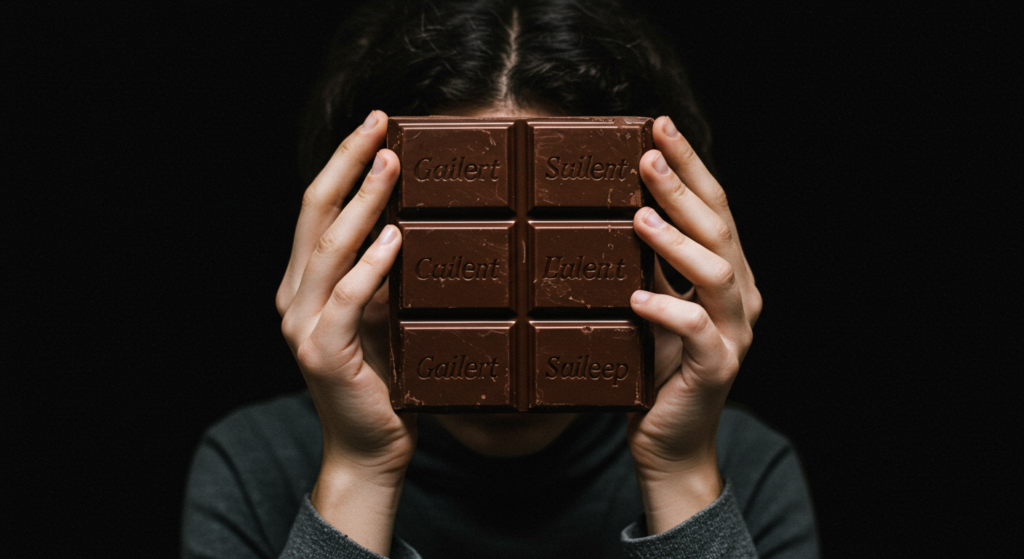
Key Takeaways
- About 85% of Americans use caffeine products daily1.
- Caffeine can significantly impact sleep quality; moderating intake is essential2..
- Chocolate contains both caffeine and theobromine, which can affect sleep patterns.
- Understanding chocolate consumption is key to managing sleep disruption.
- Sleep disorders may be exacerbated by caffeine intake, including from chocolate.
- Making informed choices about late-night snacking can enhance sleep quality.
The Nature of Caffeine and Sleep
Caffeine affects sleep by blocking signals that tell us to sleep. This makes it hard to fall asleep and stay asleep. It peaks in the blood 30 to 60 minutes after drinking, lasting 3 to 5 hours. This means afternoon caffeine can still affect sleep at night.
Dark chocolate, with its caffeine and theobromine, can also disrupt sleep. Studies show it can make it hard to sleep well3.
Dark chocolate might lower blood pressure in some people. But, it can also affect sleep, especially for those who are sensitive to caffeine4. It can also change blood sugar and cholesterol levels, impacting heart health and sleep4.
Knowing how caffeine affects sleep is key. It might wake us up at first, but it can mess with our sleep over time. Being mindful of what we eat, especially chocolate with a lot of caffeine, helps keep our sleep good.
Understanding Chocolate Consumption
Chocolate is getting more popular, especially for those looking for healthier desserts. People want to enjoy chocolate but also watch their diet. Dark chocolate is often chosen for its health perks, but it’s important to remember it can be high in sugar.
Research links high sugar intake to sleep problems. Eating sugary foods like chocolate before bed can cause blood sugar spikes. This can hurt your sleep quality. It’s known that 70% of people have trouble sleeping after eating big meals before bed5.
Chocolate can be a tempting late-night snack. But, while dark chocolate has antioxidants, sugary chocolate can disrupt sleep. Knowing how chocolate affects sleep can help you sleep better.
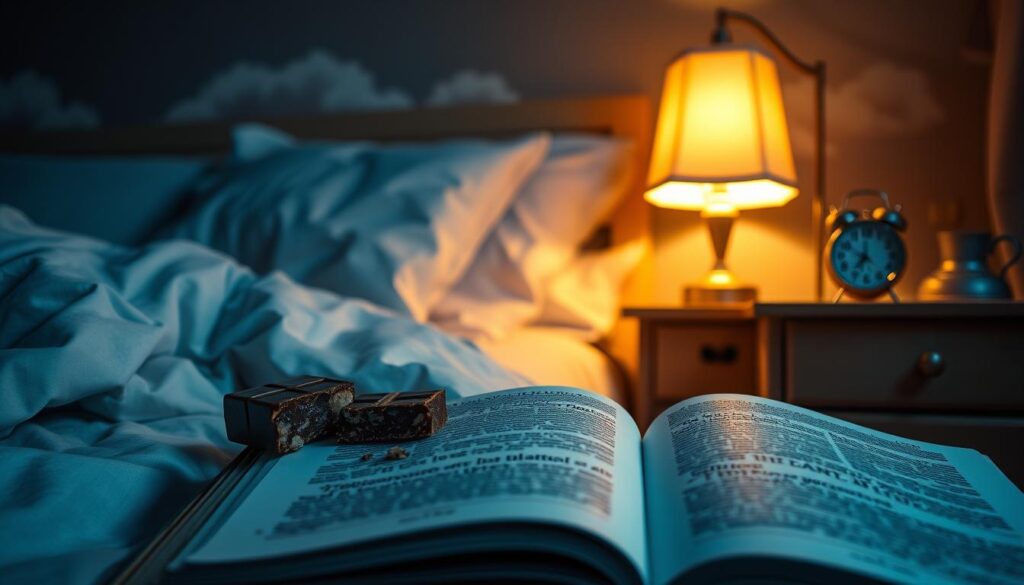
Caffeine Content in Different Types of Chocolate
Caffeine is found in many types of chocolate. It affects how much energy and sleep we get. For example, a 100g bar of dark chocolate with 70% cocoa has about 80mg of caffeine6. One large square of dark chocolate has about 25mg6.
This shows dark chocolate can have a lot of caffeine. Milk chocolate, however, has much less caffeine. It has about 20mg per whole bar6. This makes milk chocolate a good choice for those who want something sweet but less caffeine.
It’s important to know how much caffeine we get from chocolate. This is especially true when we compare it to coffee and tea. One mug of instant coffee has about 100mg of caffeine6. This is much more than any chocolate.
Knowing how much caffeine is in chocolate helps us watch our intake, especially at night. Dark chocolate can disrupt sleep more than milk chocolate if eaten too close to bedtime. Knowing this helps us choose snacks that won’t mess up our sleep.
Theobromine Effects and Sleep Quality
Theobromine is found in cacao and affects sleep quality when we eat chocolate. It’s like caffeine but less strong. It doesn’t bind as well to brain receptors, which might help it not mess up our sleep as much7.
Research says theobromine can make us feel better without messing up our sleep. Eating high-quality cacao can even help our heart and brain8. But, some chocolates have too much caffeine, not theobromine, which can make us feel jittery or keep us awake.
Also, studies found that more theobromine might lower blood pressure and make us more curious. So, chocolate has stimulants, but theobromine’s effect on sleep is still being studied7.
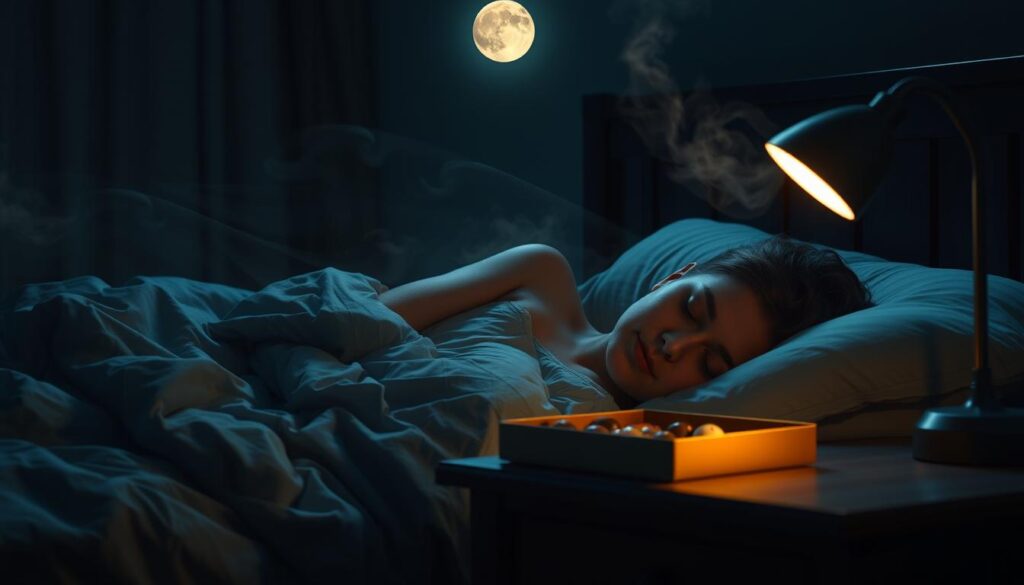
Sweet Dreams or Caffeine Jitters? How Chocolate Affects Your Sleep
The link between caffeine and sleep is tricky, especially with chocolate. Chocolate has different levels of caffeine, affecting sleep in various ways. Knowing how caffeine affects sleep can help choose better chocolate, especially at night.
Overview of Caffeine’s Impact on Sleep
Caffeine is known for its energizing effects. Too much can mess with sleep quality and amount. It can make you feel tired, change your mood, and even harm your health9.
Caffeine stops adenosine in the brain, messing with sleep patterns9. People worldwide drink a lot of caffeine, showing how much they love it9.
Link Between Chocolate Types and Sleep Disruption
Chocolate comes in many flavors and caffeine levels. Dark chocolate has some caffeine but is milder than coffee or energy drinks9. Eating a small amount of dark chocolate every few days can be good, but it has caffeine too10.
But, if you’re sensitive to caffeine, eating chocolate with more caffeine can mess with your sleep, especially at night9.
| Chocolate Type | Caffeine Content (mg per 100g) | Potential Sleep Disruption |
|---|---|---|
| Milk Chocolate | 25 | Low |
| Dark Chocolate | 50-70 | Moderate |
| Bittersweet Chocolate | 80-90 | High |
If you want to enjoy chocolate and sleep well, pick the right type and amount, especially before bed. Knowing about caffeine’s effect on sleep helps make better snack choices.
Chocolate as a Late-Night Snack: Good or Bad?
Chocolate is a favorite late-night snack for many. It brings joy but also has downsides. Dark chocolate, for example, is full of antioxidants. Yet, its caffeine can mess with sleep.
Research shows dark chocolate has as much caffeine as a coffee. This can keep you awake, especially if you’re sensitive11. About 50 to 70 million adults in the U.S. struggle with sleep. This makes what we eat before bed very important11.
Dark chocolate can be good for you, but it’s key to think about its impact on sleep. Caffeine and theobromine in chocolate can disrupt sleep. They can make mornings feel less refreshing12.
High-sugar chocolates can also mess with your sleep. They can cause blood sugar swings, breaking your sleep cycle. So, picking the right chocolate is crucial for good sleep.
Enjoying chocolate at night needs careful thought. Choose low-sugar, low-caffeine options for a treat that won’t ruin your sleep. Chocolate can be part of a late-night routine, as long as it doesn’t harm your sleep hygiene.
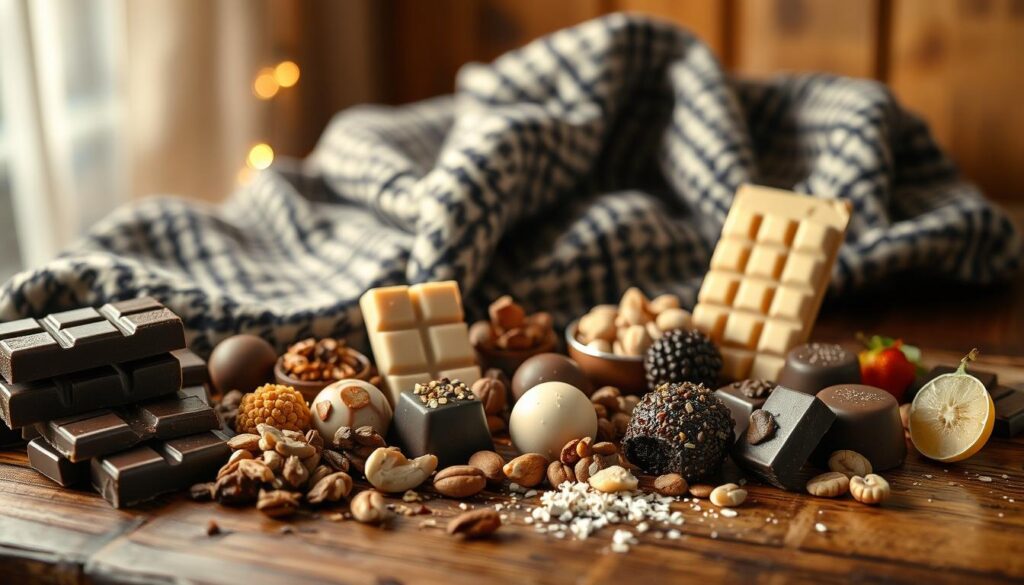
Exploring Sleep Disorders Related to Caffeine
Sleep disorders, like insomnia, often get worse with caffeine. People who drink caffeine before bed have trouble sleeping deeply. This makes it hard for them to recover well.
Adults should not have more than 400 mg of caffeine a day to avoid sleep problems13. Kids under 11 should not have any caffeine because it can cause insomnia and jitters13.
Caffeine in coffee, tea, and chocolate can make sleep disorders worse14. Teens aged 12 to 17 should not have more than 100 mg of caffeine a day. This is because its effects on health are still being studied13.
Studies show caffeine can make anxiety worse and make it harder to fall asleep14.
Too much caffeine can make you restless and disrupt your sleep cycle14. To sleep better, avoid caffeine four to five hours before bedtime14.
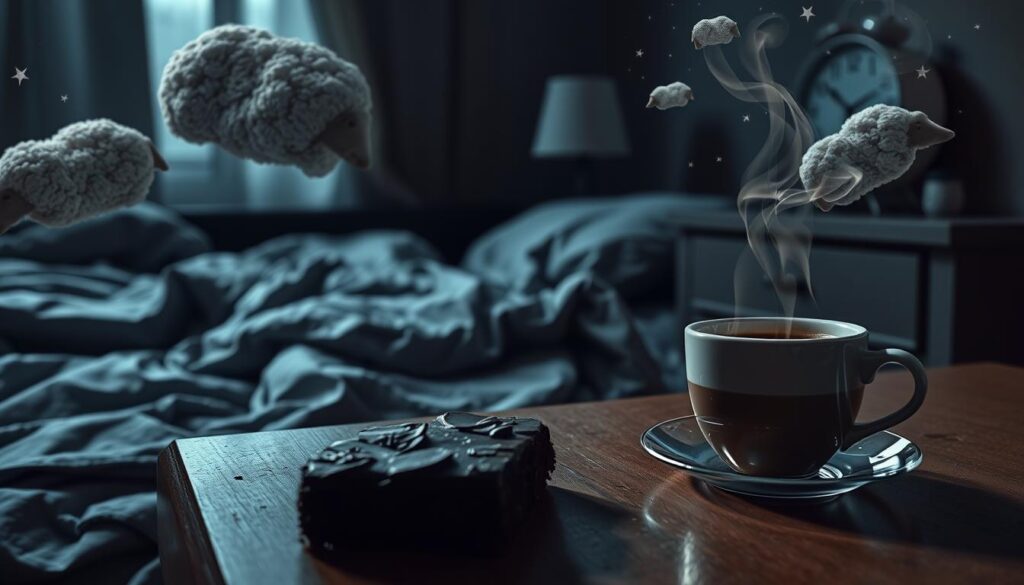
Strategies for Healthier Late-Night Snacking
Choosing better snacks at night can really help you sleep better. Many people grab chocolate or sweet snacks before bed. But, these can hurt your sleep quality. Instead, pick snacks that help you relax and sleep well.
Alternative Foods for Better Sleep
Snacks that help you relax are key to better sleep. Here are some good choices:
- Bananas: They’re full of potassium and magnesium. These help you relax and sleep better15.
- Almonds: They have tryptophan and magnesium. These relax your muscles and keep your blood sugar steady for sleep15.
- Oats: Eating oats before bed boosts insulin. This helps you relax and sleep easier15.
- Tart cherry juice: It’s full of melatonin. This helps your body use tryptophan better16.
- Honey: It raises glycogen levels. This helps make serotonin and melatonin for better sleep15.
Avoiding chocolate and sweets before bed is smart. They can make your blood sugar go up and down. This can mess with your deep sleep. The right snacks before bed help you sleep better and stay healthy.
As we prioritize our sleep, choosing the right snacks becomes a pivotal part of a holistic approach to health and wellness.
Insomnia Remedies: Can Chocolate Help?
The link between chocolate and sleep is a topic of debate. Chocolate has magnesium and antioxidants, which can help relax17. But, it also has caffeine, which can disrupt sleep. For example, hot chocolate has about 5mg of caffeine per mug, less than decaf coffee18.
How people react to chocolate differs. Some find hot chocolate calming before bed. But, others might feel more awake, making it a bad choice for insomnia. The key is to eat chocolate in small amounts to enjoy its benefits without problems.
Chocolate’s impact on sleep depends on how it’s eaten. Adding it to foods that help sleep, like almonds or tart cherry juice, might be better. These foods boost hormones that help you sleep. Thinking about these things can help you decide if chocolate is good for your bedtime routine1.
Dietary Habits Impacting Sleep Quality
Diet affects sleep a lot. Most Americans eat too much sugar. This can cause sleep problems and mood issues19. Eating too much sugar can make you feel like you didn’t sleep well, affecting your rest20. Eating fatty foods can also make you feel anxious, making it hard to sleep well19.
To sleep better, eat complex carbs and proteins at night. Foods like fatty fish and cherries help sleep. Kiwifruits and cherry juice also improve sleep21. Eating at the same time every day is also key for good sleep.
What you drink matters too. Warm milk and almond milk help you sleep. But drinks with caffeine, like black tea and coffee, hurt sleep20. Try herbal teas like chamomile or ashwagandha to relax before bed20.
| Food/Beverage | Effect on Sleep |
|---|---|
| Warm Milk | Promotes feelings of sleepiness |
| Chamomile Tea | Improves sleep quality and reduces anxiety |
| Tart Cherry Juice | Increases melatonin availability, promoting good sleep |
| Fatty Fish | Improves overall sleep quality |
| High Sugar Foods | Impair sleep and increase anxiety |
Choosing what you eat wisely can really help your sleep and health. It’s important to think about what you eat.
Natural Sleep Aids: The Role of Diet
What you eat can really affect how well you sleep. Adding natural sleep aids to your meals can help you rest better. Many foods have nutrients that help you relax and sleep well. Knowing which foods for better sleep to eat can improve your diet for sleep.
Foods to Incorporate for Improved Sleep
There are many foods that help you sleep better. Here are some good ones:
- Edamame: Full of magnesium, which helps you sleep better and longer22.
- Dark Leafy Greens: They have potassium, which stops muscle cramps at night22.
- Bananas: They have vitamin B6 and tryptophan, helping make serotonin into melatonin22.
- Kiwis: They have vitamins C and E, fighting stress and helping you sleep better22.
- Cherries: They naturally have melatonin, making you sleep longer and better23.
- Almonds: They have tryptophan and magnesium, helping muscles relax23.
- Honey: It raises glycogen levels and helps release serotonin and melatonin23.
Eating a balanced diet with these foods for better sleep can really help your health. For quick snacks, try making dishes with these ingredients:
| Snack | Ingredients | Benefits |
|---|---|---|
| Banana Almond Smoothie | Banana, almond milk, honey | Promotes relaxation and better sleep24. |
| Kiwi Salad | Kiwi, spinach, walnuts | Rich in vitamins to combat stress and improve sleep quality24. |
| Cherry Oatmeal | Cherries, oats, almond milk | Natural melatonin source supports sleep23. |
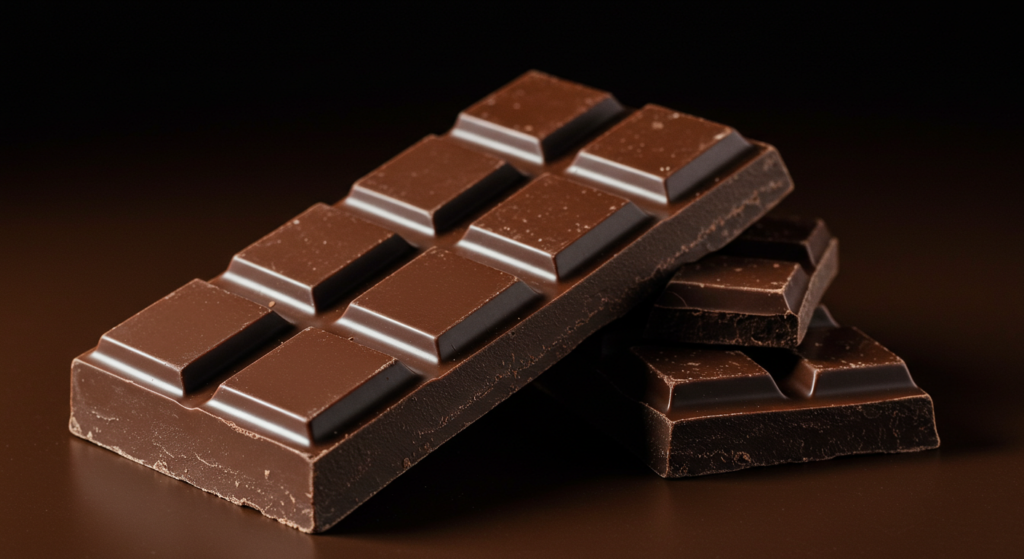
Moderation: The Key to Healthy Snacking
It’s important to have a good relationship with food, especially with treats like chocolate. Chocolate can be fun, but eating it in moderation is key. Too much can mess with sleep and health.
Caffeine, found in many foods and drinks, affects sleep. About 80 percent of American adults drink it every day. The FDA says adults should not have more than 400 mg of caffeine a day2.
Knowing how much chocolate or caffeinated snacks you can have is important. A typical 8-ounce coffee has 100 mg of caffeine. This can add up fast if you drink or eat many things with caffeine2.
Healthy snacking habits help sleep better. Foods rich in potassium and magnesium can help counter caffeine’s effects. These minerals are found in foods like bananas and spinach.
To manage caffeine, follow these tips:
- Watch how much you eat, keeping snacks small.
- Drink caffeine in the morning to avoid it at night.
- Choose snacks that are good for sleep, like fruits and nuts.
Snacking in a balanced way is good for you. It lets you enjoy chocolate without hurting your sleep or health.
Emphasizing moderation ensures that chocolate remains a delightful treat rather than a disruptive force in one’s diet.
It’s all about eating snacks in balance and watching caffeine intake. This is how you get the best health results22.
Conclusion
The link between chocolate and sleep is complex. Chocolate can be a tasty treat, but it has caffeine and theobromine. These can mess with your sleep, especially if eaten too close to bedtime.
Knowing about caffeine is key for good sleep habits. Even a little chocolate can hurt your sleep if eaten at the wrong time. It’s important to think about how chocolate fits into your diet.
Many people eat chocolate late at night without knowing its impact. Different chocolates have different amounts of caffeine. So, it’s important to choose wisely to get better sleep.
Being careful with snacks and caffeine, including chocolate, helps improve sleep. Finding the right balance between treats and healthy habits is important. This way, you can enjoy chocolate and still sleep well25261.
FAQ
Does chocolate really affect sleep quality?
How does caffeine in chocolate influence sleep?
Are there different levels of caffeine in various types of chocolate?
What role does theobromine play in sleep quality?
Can late-night chocolate snacking disrupt my sleep?
How do sleep disorders relate to caffeine consumption?
What healthier alternatives can I choose for late-night snacks?
Can chocolate be considered an insomnia remedy?
What dietary changes can improve sleep quality?
Which foods should I incorporate as natural sleep aids?
How can I practice moderation while snacking on chocolate?
Source Links
- Sleep and caffeine – https://sleepeducation.org/sleep-caffeine/
- Is Caffeine Causing Your Sleeplessness? – https://www.psychologytoday.com/intl/blog/sleep-newzzz/201711/is-caffeine-causing-your-sleeplessness
- 5 Foods To Stop Eating Before Bed + 5 To Start – https://ca.organictraditions.com/blogs/articles/5-foods-to-stop-eating-before-bed-5-to-start?srsltid=AfmBOooMih8eMxWa1d4B-dBUsiWlY0dYHV9dFJOK73C6pxohWdU8VmrH
- COCOA: Overview, Uses, Side Effects, Precautions, Interactions, Dosing and Reviews – https://www.webmd.com/vitamins/ai/ingredientmono-812/cocoa
- Drinks That Help You Sleep & What To Avoid – https://www.healthspan.co.uk/advice/mind/drinks-to-help-you-sleep-easy/?srsltid=AfmBOopC2WoBQgmRbTgs3sYSm215nLBTCM_6iwLqkXRU10dBSawXVOm4
- The 7 surprising foods with caffeine that could be keeping you awake at night – https://www.thesun.co.uk/wellness/25679197/surprising-foods-with-caffeine-keep-you-awake/
- Ultimate Guide to Cacao: Cacao Dosage, Benefits & Ceremonial Use – https://thethirdwave.co/psychedelics/cacao/
- Cacao vs. Cocoa: What’s the Difference? – https://aloha.com/blogs/articles/cacao-vs-cocoa?srsltid=AfmBOoo-7oaVc0KVWPINgG4qbHK37FVnw6hNLo7QmriJyo6cqXB3OoBH
- Are You In Love With Chocolate | Dr. Berg – https://www.drberg.com/blog/are-you-in-love-with-chocolate?srsltid=AfmBOoqKp5b9oRNDyGWOF6f0PKAfviRWAwym51dkkSPnoBHCG3GPhpbP
- The Truth About Chocolate, Cocoa, and the Theobromine Effect – https://medium.com/tessas-web-log/the-truth-about-chocolate-cocoa-and-the-theobromine-effect-baa2b38b1fe
- The 8 Foods That Disrupt Your Sleep – https://www.huffpost.com/entry/the-8-foods-that-disrupt-your-sleep_n_57e534f5e4b0e28b2b536696
- 5 Foods To Stop Eating Before Bed + 5 To Start – https://ca.organictraditions.com/blogs/articles/5-foods-to-stop-eating-before-bed-5-to-start?srsltid=AfmBOoqmZ3vTDjbtlRyvAnGK7t_l_AMEQEOHyQi8NRZj-4Lp8Np_FRp6
- Caffeine and Kids – https://www.cuimc.columbia.edu/news/caffeine-and-kids
- Trouble sleeping? Drinking the right tea can help – https://www.glasshouseretreat.co.uk/blog/post/trouble-sleeping-drinking-the-right-tea-can-help
- 5 Foods To Stop Eating Before Bed + 5 To Start – https://ca.organictraditions.com/blogs/articles/5-foods-to-stop-eating-before-bed-5-to-start?srsltid=AfmBOoqy4rbzsuX6tObcXXtWN8r3BZ8dk9N5y8gacNMtsqh-sw10siWd
- Drinks That Help You Sleep & What To Avoid – https://www.healthspan.co.uk/advice/mind/drinks-to-help-you-sleep-easy/?srsltid=AfmBOoobLIXlBOSQ48hpUsqpEp_ZnIUuycgkqJKK8cWfK-eydWAkdIFe
- Drinks That Help You Sleep & What To Avoid – https://www.healthspan.co.uk/advice/mind/drinks-to-help-you-sleep-easy/?srsltid=AfmBOorCCXC7RmZKrarU1Z9Whd1DIeaDlc574bnpR9F3XWsEegQnmOsc
- Caffeine and Wellness: Finding Balance for Productive Days and Restful Nights – Shepherd’s Dream – https://shepherdsdream.com/blog/sleep-healthy-living/caffeine-and-wellness-finding-balance-for-productive-days-and-restful-nights/?srsltid=AfmBOopSbfxpMkxck-ic-3bPh64AEPX9tdJvAmUcvq8ZKUsWyXZ6fo3P
- Your Anxiety Loves Sugar. Eat These 3 Things Instead – https://www.healthline.com/health/mental-health/how-sugar-harms-mental-health
- Drinks That Help You Sleep & What To Avoid – https://www.healthspan.co.uk/advice/mind/drinks-to-help-you-sleep-easy/?srsltid=AfmBOooTrRJwars9m7sz-WEDx6QDaLLmW_8tUbBGsRDkcwCOf4LVY4WW
- Eight Foods to Help You Sleep Better, According To Experts | 91������� – http://www.bdpoteet.com/blog/foods-to-help-you-sleep
- Best Fruits and Vegetables to Help You Sleep – eachnight – https://eachnight.com/sleep/best-fruits-and-vegetables-for-sleep/
- 5 Foods To Stop Eating Before Bed + 5 To Start – https://ca.organictraditions.com/blogs/articles/5-foods-to-stop-eating-before-bed-5-to-start?srsltid=AfmBOooLzRY9gdzLdDQUKVjnUXliBTYfMuEC_nAemXWZe3HxuLaNoMOQ
- 7 Drinks That May Help You Sleep – https://www.healthline.com/nutrition/drinks-that-help-you-sleep
- Top Tips for Getting Sleep Fit | Blog | Active8me – https://www.active8me.com/top-tips-for-getting-sleep-fit/
- I tried to quit caffeine by replacing it with mushrooms – https://inews.co.uk/inews-lifestyle/rainbow-dust-mushroom-replace-coffee-2327660?srsltid=AfmBOor-CLtRfsqvpBXxv1yfr0IUcT_IfYrM8EUUN-b8vELzSi-Gzg1J